Select Language
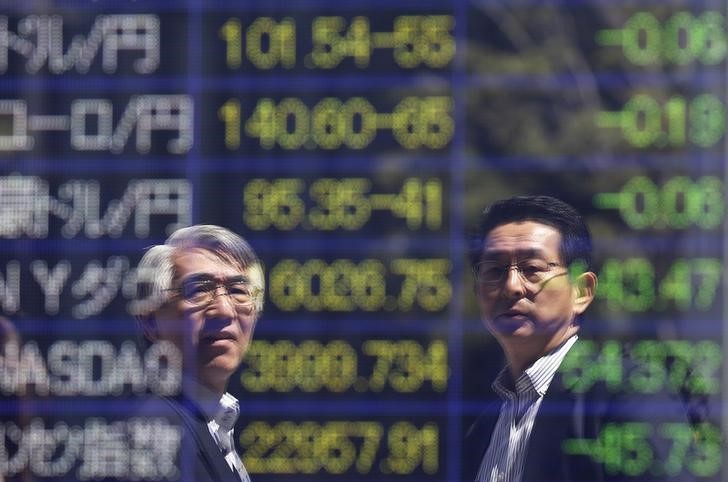
Investing.com-- Most Asian stocks rose on Monday as investors piled into cyclical stocks heading into the last week of November, while focus turned to a slew of upcoming economic readings, including China’s industrial data and India’s third-quarter GDP.
Sentiment was also buoyed by U.S. President-elect Donald Trump's nomination of prominent investor Scott Bessent as Treasury Secretary, with Bessent seen holding a much more moderate view on trade tariffs.
Regional markets tracked Friday's gains on Wall Street, where demand for economically sensitive sectors saw the Dow Jones Industrial Average close at a new high, and S&P 500 mark its fifth winning day in a row.
U.S. stock index futures rose in Asian trade, tracking optimism over Bessent's appointment. Bond yields also fell after his appointment, lending stocks more space to rise.
Investors shrugged off risk worries induced by heightened tensions between Russia and Ukraine. Moscow launched an advanced hypersonic missile on a Ukrainian facility last week and threatened nuclear retaliation for Kyiv’s use of Western-made, long-range missiles.
Japan’s Nikkei 225 index added 1.2%, while the TOPIX rose 1%. Both indexes logged weekly losses last week.
South Korea’s KOSPI rose 1.4%, while Indonesian shares, specifically the Jakarta Stock Exchange Composite Index jumped 1.7%.
Bucking the trend, China's Shanghai Shenzhen CSI 300 and Shanghai Composite indexes were down 0.6% and 0.4%, respectively. Hong Kong’s Hang Seng index shed 0.4%.
Futures for India’s Nifty 50 index pointed to strong open. Reuters reported that Adani dollar bond prices fell to almost one-year lows on Monday as investors cut their exposure to the Indian conglomerate in the wake of bribery and fraud allegations from U.S. authorities.
Econ. data barrage on tap this week
Singapore is scheduled to release its inflation figures for October later in the day. Economists polled by Reuters expect the headline inflation rate of 1.8%, down from the 2% in the previous month.
South Korea's central bank is set to decide on interest rates on Wednesday, while November inflation numbers from Japan’s capital city of Tokyo will be released on Friday.
India is set to release its third-quarter GDP report on Friday, while China will release purchasing managers index data on Saturday. Before that, industrial profit data from China is due on Wednesday.
In the U.S., the Federal Reserve’s preferred measure of inflation, the personal consumption expenditures (PCE) price index, is to be released on November 27.
Australian shares hit record high
Australia's ASX 200 hit an all-time-high of 8452.1 points with a 0.7% rise on Monday, helped by gains in cyclical stocks such as banks and miners. The trade was underpinned by a global push into economically sensitive sectors, as investors bet on more expansionary policies under a Trump administration in the U.S..
In corporate news, Australia’s largest vehicle fleet management and leasing group SG Fleet Group Ltd (ASX:SGF) jumped as much as 24% after it confirmed that it is in discussions regarding a A$1.2 billion ($785 million) buyout offer from private equity group Pacific Equity Partners (PEP)
Australian inflation readings for October are also scheduled to be out on Wednesday.

Investing.com -- J.P. Morgan’s 2025 U.S. economic outlook outlines two potential paths for the nation’s economy, hinging on the policy environment set by the recently elected administration.
Analysts emphasize that these paths reflect a tension between stimulus-oriented policy changes and the uncertainty surrounding trade and regulation.
The note flags key economic indicators and forecasts for the year ahead, including GDP growth, unemployment trends, inflation dynamics, and fiscal and monetary policy implications.
J.P. Morgan argues that the recent election, which brought a red-wave administration to power, introduces a dual narrative for 2025.
On one hand, tax cuts and deregulation could invigorate business confidence and productivity, potentially boosting GDP growth while keeping inflation manageable.
On the other, heightened policy uncertainty—driven by tariffs, restrictive immigration measures, and potential geopolitical tensions—might create a stagflationary scenario with weaker growth and elevated inflation risks.
J.P. Morgan projects a moderate slowdown in GDP growth to 2% in 2025, with unemployment expected to rise slightly to 4.5%.
Despite this cooling, the business cycle appears resilient, with labor market tightness gradually easing.
Job growth is predicted to remain subdued, and layoffs are likely to stay low. However, reduced immigration could constrain labor supply and growth in key industries.
Wage growth is also expected to cool further, falling into the low 3% range by the second half of the year. Combined with modest productivity gains, these dynamics suggest that real compensation growth will continue to support consumer spending, albeit at a slower pace.
Core PCE inflation, a key metric for the Federal Reserve, is expected to decelerate to 2.3% by year-end, closer to the Fed’s long-term 2% target. Inflation pressures from tariffs on China, however, could present risks.
A proposed 60% across-the-board tariff on Chinese goods, if implemented, might raise core inflation by 0.2 percentage points, though the broader impact on price stability remains uncertain.
The Federal Reserve is projected to continue easing monetary policy, with incremental rate cuts throughout the year.
By September, the Fed funds target rate is expected to stabilize at 3.5-3.75%, a shift reflecting the Fed’s cautious optimism about managing inflation without undermining employment.
Trade policy looms large in the 2025 outlook. Analysts expect new tariffs on China to disrupt trade flows, reducing U.S. export growth while raising costs for imported goods. Meanwhile, the potential for broader tariff measures—targeting global trade—adds to the uncertainty.
On the fiscal side, the report anticipates a significant expansion in federal deficits. The likely extension of the 2017 Tax Cuts and Jobs Act provisions, alongside increased defense and domestic spending, could push the deficit to 7% of GDP by 2026.
Such levels are concerning in an environment of full employment and muted GDP growth.
Corporate investment is expected to grow modestly, buoyed by consumer demand and federal incentives for specific sectors like infrastructure and technology.
However, analysts note that business spending remains cautious, with companies prioritizing balance sheet health over expansion.
Real consumer spending, a key driver of economic activity, is forecasted to grow at a slightly slower rate of 2% in 2025.
Moderating wage growth, combined with tighter credit conditions and reduced household savings, will likely temper the pace of consumption.

By Florence Tan
SINGAPORE (Reuters) - Oil prices hovered near two-week highs on Monday following 6% gains last week, as geopolitical tensions heightened between western powers and major oil producers Russia and Iran, raising risks of supply disruption.
Brent crude futures climbed 13 cents, or 0.2%, to $75.30 a barrel by 0115 GMT, while U.S. West Texas Intermediate crude futures were at $71.38 a barrel, up 14 cents, or 0.2%.
Both contracts last week notched their biggest weekly gains since late September to reach their highest settlement levels since Nov. 7 after Russia fired a hypersonic missile at Ukraine in a warning to the United States and UK following strikes by Kyiv on Russia using U.S. and British weapons.
"The recent exchanges indicate the war has entered a new and dangerous phase, raising concerns of disruptions to supplies," ANZ analysts led by Daniel Hynes said in a note.
In addition, Iran reacted to a resolution passed by the U.N. nuclear watchdog on Thursday by ordering measures such as activating various new and advanced centrifuges used in enriching uranium.
"The IAEA censure and Iran’s response heightens the likelihood that Trump will look to enforce sanctions against Iran’s oil exports when he comes into power," Vivek Dhar, a commodities strategist at Commonwealth Bank of Australia (OTC:CMWAY) said in a note.
Enforced sanctions could sideline about 1 million barrels per day of Iran’s oil exports, about 1% of global oil supply, he said.
The Iranian foreign ministry said on Sunday that it will hold talks about its disputed nuclear programme with three European powers on Nov. 29.
Investors were also focused on rising crude oil demand at China and India, the world's top and third-largest importers, respectively.
China's crude imports rebounded in November as lower prices drew stockpiling demand while Indian refiners increased crude throughput by 3% on year to 5.04 million bpd in October, buoyed by fuel exports.
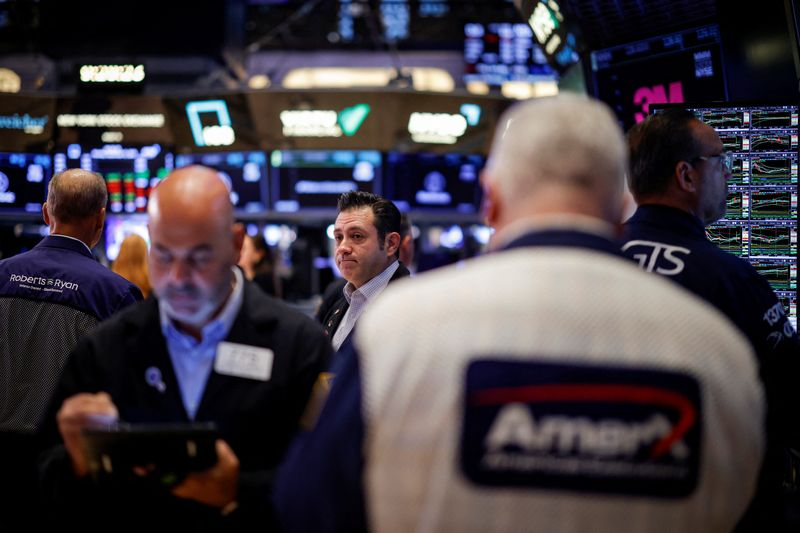
Investing.com -- The US is to release inflation numbers which will be closely watched as investors try to gauge the future path of Federal Reserve interest rates, while the start of the holiday shopping season and more retail earnings will show how consumer spending is holding up in the face of higher prices. Here's your look at what's happening in markets for the week ahead.
1. Inflation data
The US is set to release the Personal Consumption Expenditures Price index, the Federal Reserve's preferred gauge of underlying inflation, on Wednesday.
Economists are expecting the PCE index to have risen 2.3% annually in October.
While the U.S. is due to release November data on both consumer and producer prices before the Fed’s next meeting on Dec. 17-18 this will be the final PCE report before then.
Recent stubborn inflation data has seen the Fed take a cautious stance towards further interest rate cuts.
Market expectations around whether the Fed will deliver another 25-basis point cut in December or pause are split amid uncertainty over the potential for a rebound in inflation under the incoming Trump administration.
2. Black Friday
Investors will get fresh insights into the health of the U.S. consumer and the retail sector in the coming week as Black Friday marks the start of the holiday shopping season, which will likely indicate how shoppers are coping with higher prices.
Earnings results from two major retailers last week gave two very different perspectives. On Tuesday, Walmart (NYSE:WMT) raised its annual sales and profit forecast for the third consecutive time, while Target shares dropped sharply on Wednesday after it forecast holiday-quarter comparable sales and profit below estimates.
A fresh batch of retail earnings are also due in the coming days, with Best Buy (NYSE:BBY), Macy's (NYSE:M), Nordstrom (NYSE:JWN) and Urban Outfitters (NASDAQ:URBN) all due to report.
3. Trump trade
The ‘Trump trade’ looks likely to remain a key driver of market activity for now.
Investors who bet on "buy crypto and the dollar, sell foreign assets or green" are still in profit, despite a slight slowdown in momentum. Bitcoin is nearing $100,000, up around 50% since early October, when markets favored a Trump election victory. The dollar index has risen 3.6%.
Clean energy, a Trump target, is the worst performer, with iShares' clean energy ETF down nearly 14%. The Mexican peso has lost more than 4%, while European equities are off around 3%.
However, resistance to Trump-driven trades could increase as concerns about stock valuations grow or geopolitical risks challenge the rally in risk assets.
4. Oil prices
Oil prices rose around 1% on Friday, to settle at the highest level in two weeks, as an escalation in the war in Ukraine boosted geopolitical risk premium.
Both crude benchmarks ended the week with gains of about 6% as Moscow stepped up its offensive after Britain and the U.S. allowed Kyiv to strike deeper into Russia with their missiles.
Meanwhile, China, the world's largest oil importer, announced policy measures to boost trade, including support for energy product imports, amid worries over the incoming Trump administration’s threats to impose tariffs.
5. Eurozone inflation
The Eurozone is to release what will be closely watched inflation data on Friday as markets try to gauge the path of European Central Bank monetary policy.
Inflation rebounded to 2% in October after falling below the ECB’s 2% target the prior month.
Data on Friday showed that business activity in the bloc deteriorated sharply this month as the services industry contracted and manufacturing sank deeper into recession.
The ECB has cut rates three times this year and markets are expecting another 25-basis point rate cut in December amid concerns over the economic outlook for the region.
Meanwhile, ratings agency Standard and Poor’s is due to review France's credit rating after Fitch and Moody recently downgraded their outlooks to negative.
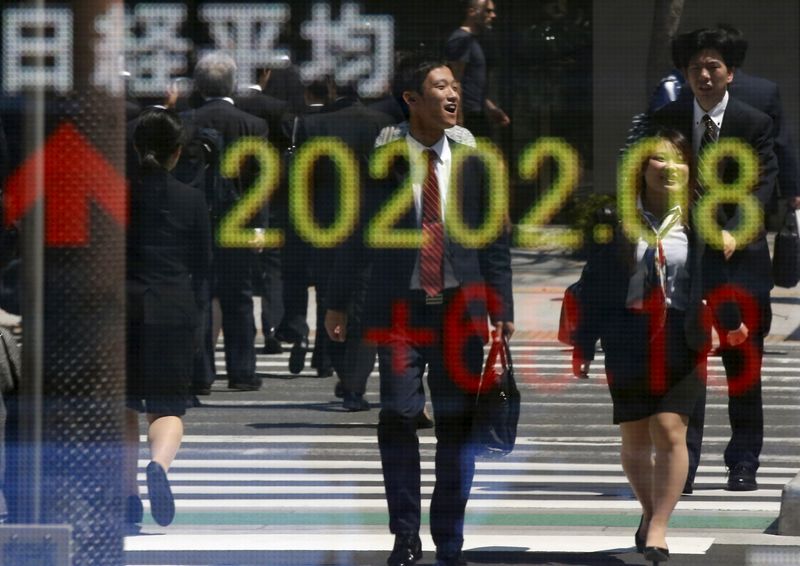
Investing.com-- Most Asian stocks rose on Friday, buoyed by strength in chipmaking and cyclical stocks, which helped markets weather heightened tensions over the Russia-Ukraine war.
Regional markets took some positive cues from Wall Street, with chipmaking stocks tracking strength in NVIDIA Corporation (NASDAQ:NVDA), which hit a record high on Thursday.
But broader tech stocks were rattled by a sharp drop in Alphabet Inc Class A (NASDAQ:GOOGL) after U.S. authorities made several recommendations to break up the firm’s alleged monopoly in online search.
U.S. stock index futures were flat in Asian trade, as risk appetite was battered by heightened tensions between Russia and Ukraine. Moscow launched an advanced hypersonic missile on a Ukrainian facility this week and threatened nuclear retaliation for Kyiv’s use of Western-made, long-range missiles.
Most Asian stocks rose past weak risk appetite on Friday, although they were still nursing some losses for the week.
Japanese shares rise past middling economic data
Japan’s Nikkei 225 index added 1.2%, while the TOPIX rose 0.8% on gains in tech and cyclical sectors. Both indexes were also headed for mild weekly losses.
Economic readings offered mixed cues on Japan’s economy. Consumer price index inflation data read slightly higher than expected for October, with underlying inflation rising further above the Bank of Japan’s 2% target. Sticky inflation is likely to invite more rate hikes by the BOJ, with a meeting scheduled for December.
Japanese business activity underwhelmed, with purchasing managers index data showing manufacturing activity shrank more than expected in November. Services activity also barely expanded during the month.
Broader Asian markets were mostly upbeat on Friday. Australia’s ASX 200 rose 1.1%, benefiting greatly from a shift into economically sensitive sectors. The index was also close to record highs.
Australian PMI data showed a contraction in both manufacturing and services activity.
South Korea’s KOSPI rose 1.2%, buoyed by an over 4% jump in memory chip giant SK Hynix Inc (KS:000660), as it tracked strength in Nvidia. While Nvidia’s revenue guidance for the current quarter had initially underwhelmed markets, analysts still maintained a largely positive view on the stock, citing continued demand from artificial intelligence.
Chinese stocks lagged, with the Shanghai Shenzhen CSI 300 and Shanghai Composite indexes losing 0.5% each. Hong Kong’s Hang Seng index shed 0.2%, as sentiment towards China was quashed by a lack of details on more stimulus measures.
Indian stocks nurse losses amid Adani jitters
Futures for India’s Nifty 50 index pointed to a flat open, after the index slid to an over five-month low on Thursday.
The Nifty was already nursing steep losses through October, having fallen into correction territory after losing over 10% from a September record high.
Sharp (OTC:SHCAY) losses in shares under the Adani Group added to the Nifty’s decline on Thursday, after the conglomerate’s Chairman Gautam Adani was indicted in the U.S. over allegations of bribery and corruption.
The conglomerate’s flagship Adani Enterprises Ltd (NS:ADEL) slid 22.6%% on Thursday, while Adani Ports and Special Economic Zone Ltd (NS:APSE) lost nearly 14%.
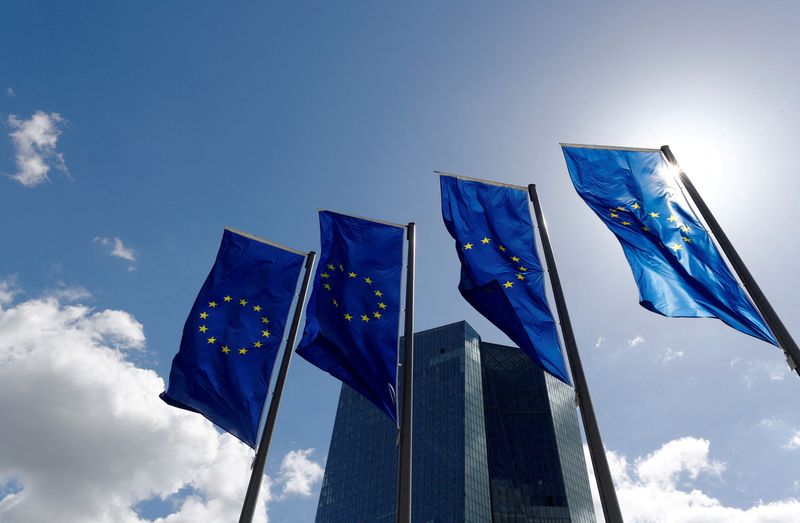
By Harry Robertson
LONDON (Reuters) - Investors will have to buy a record amount of euro zone government bonds for a third straight year in 2025 and without the ECB in the market, potentially adding pressure on borrowing costs when political and economic uncertainty is high.
Bankers and analysts said they were confident markets can soak up the more than 660 billion euros ($694.52 billion) of net bond supply, with expectations for further European Central Bank rate cuts boosting government bonds' appeal.
However, they also say that high levels of bond sales could push up long-term borrowing costs relative to yields on short-term debt, which are anchored by central bank rate expectations, resulting in a steeper yield curve.
This means euro zone countries, grappling with weak growth and political uncertainty in Germany and France, may not see big declines in borrowing costs even as the ECB lowers rates.
"I think overall it will be absorbed," said Michael Krautzberger, global chief investment officer for fixed income at Allianz (ETR:ALVG) Global Investors.
"But it's one of the reasons why the euro curves could be quite a bit steeper as a combination of rate cuts at the short end and quite a bit of supply at the long end."
Analysts stressed that countries' borrowing plans remain uncertain, with U.S. President-elect Donald Trump putting pressure on Europe to increase defence spending and with France's 2025 budget in peril.
ECB OUT
Euro zone governments are set to sell around 1.26 trillion euros of bonds gross next year, banks estimate, down very slightly from 2024 as countries try to reduce deficits after spending big amid the shocks of COVID-19 and the Ukraine war.
Crucially missing from the market in 2025 will be the ECB, which since 2014 has hoovered up trillions of euros of bonds to support the bloc through successive crises.
The ECB has already stopped reinvesting the proceeds from maturing bonds in its Asset Purchase Programme and from January will do the same for its more flexible Pandemic Emergency Purchase Programme in a process known as quantitative tightening (QT).
Investors will have to absorb somewhere between 270 and 420 billion euros of bonds that the ECB might otherwise have bought next year, according to estimates from UBS, Bank of America and BNP Paribas (OTC:BNPQY). Different assumptions about the ECB's bond holdings produce different estimates.
Once redemptions, coupons, and QT are factored in, the effective bond supply to markets will be around 660 to 670 billion euros, according to the banks.
WHAT PRICE?
Higher yields have enticed investors back to government bonds after central banks hiked rates to tame inflation. Debt office officials are optimistic appetite will remain strong.
"An important feature of this year and a half has been quite a significant return of foreign investors," Italy's debt chief Davide Iacovoni told a conference in Brussels last week.
"We're in a situation where there's an expectation of lower interest rates and of course, Italy still pays quite an elevated spread," he said, referring to the higher yields available on Italian debt than on German peers.
UBS macro rates strategist Emmanouil Karimalis said Trump's threat to impose tariffs on the EU, which would dent the euro zone economy and potentially speed up ECB rate cuts, could boost safe-haven bonds.
However, Karimalis said investors may demand a higher return or "term premium" to lock in money for the long term - given the deluge of bond sales and heightened uncertainty.
CLOUDY OUTLOOK
Bond sales might have to rise if European governments increase military spending and if Germany, which holds a snap election in February, loosens long-standing debt rules.
UBS estimated Germany is currently set to reduce its gross bond issuance to 268 billion euros, down 7 billion euros from 2024.
France is likely to increase its borrowing slightly, even if Prime Minister Michel Barnier can pass his belt-tightening budget, UBS said. That means France would have the highest net supply in the euro zone - with redemptions, coupons and QT factored in - at around 202 billion euros in 2025, up 15 billion euros from this year, according to UBS.
Underlining the uncertainty around forecasts, French far-right leader Marine Le Pen on Wednesday threatened to seek to topple Barnier over the 2025 budget. French bond yields have risen sharply since the calling of snap elections in June that resulted in a hung parliament.
Ivan Morozov, sovereign credit analyst at T. Rowe Price, said political uncertainty had put off Japanese investors, traditionally an important French buyer.
"We need to get a bit more clarity on the French political situation before they come back to the market," he said.
($1 = 0.9503 euros)
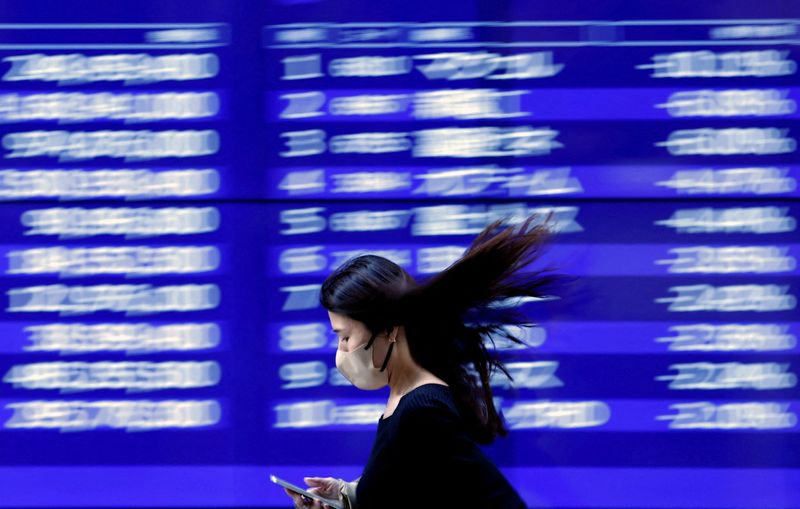
By Tom Westbrook
SINGAPORE (Reuters) - Gold was headed for its largest weekly gain in nearly eight months on Friday and the euro hovered at a 13-month low as Russia lowered its threshold for using nuclear weapons and fired a hypersonic ballistic missile at Ukraine.
The risk of escalation also sent European gas prices to a one-year high and pushed investors towards safe havens, underpinning German debt and putting the Swiss franc on course for its first weekly rise in two months.
In Asia on Friday, chipmakers led stocks a little higher after Nvidia (NASDAQ:NVDA) touched a record high in U.S. trade on solid earnings, with shares in Taiwan and South Korea up more than 1% and the Nikkei gaining 0.8%.
Gold was steady at $2,677 an ounce and up more than 4.5% for the week so far while bitcoin, stood on the brink of breaking above $100,000 for the first time.
Assets linked to Adani Group companies remained under pressure, with dollar bonds nursing losses following chairman Gautam Adani's indictment for fraud by U.S. prosecutors.
Russia on Tuesday lowered its threshold for using nuclear weapons and overnight responded to the U.S. and UK allowing Kyiv to strike Russian territory with western weapons by firing a hypersonic intermediate-range missile at Ukraine's Dnipro.
"Those weapons typically carry nuclear warheads," said analysts at ANZ Bank, noting the attack sent oil prices higher.
"The exchange indicates the war has entered a new phase, raising concerns around disruptions to supply."
Brent crude futures are up nearly 4.5% on the week and edged up to touch a two-week high of $74.44 a barrel in Asia trade.
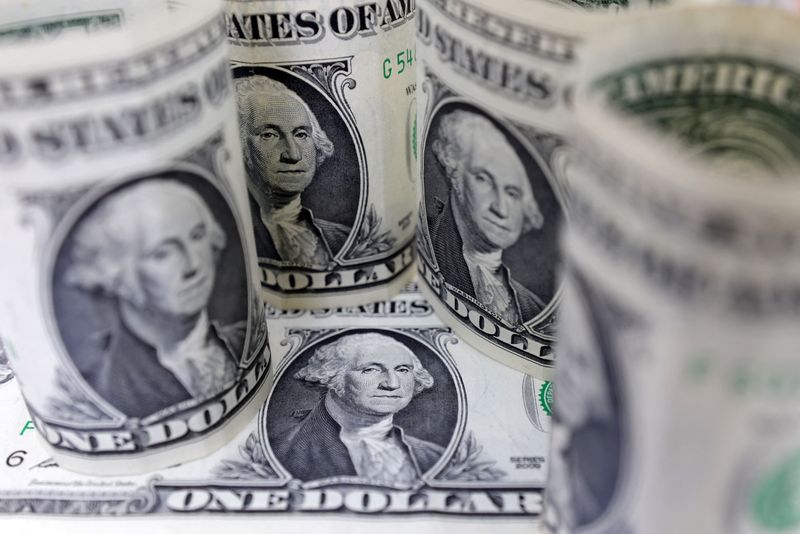
By Brigid Riley
TOKYO (Reuters) - The U.S. dollar stuck close to a 13-month high on Friday as investors assessed the outlook for the Federal Reserve's interest rate path and uncertainty in Europe kept the euro on the back foot, while bitcoin eyed the $100,000 level.
The yen, meanwhile, held its ground against the greenback after domestic core inflation figures remained above the Bank of Japan's (BOJ) 2% target in a sign conditions for further interest rate hikes were falling in place.
The dollar index edged down 0.05% to 107.01, not far off Thursday's one-year high of 107.15, its highest level since Oct. 4, 2023, with little data this week to dent its march higher.
Data overnight showed U.S. weekly initial jobless claims unexpectedly dropped to a seven-month low but also indicated some slack as it is taking longer for the unemployed to find new jobs, giving the Fed cushion to cut rates again in December.
Global PMIs are due later in the day, although those figures should not "change the dial too much," said Tony Sycamore, market analyst at IG.
"It's just trying now to find what the catalysts are ... (and) it's obviously going to be does the Fed cut or not again" in December, Sycamore said.
U.S. PCE for October scheduled for release next Friday will be the focus.
The dollar has rallied around 3% so far this month on expectations that U.S. President-elect Donald Trump's policies could reignite inflation and limit the Fed's ability to cut rates.
Recent comments from Fed officials, including Chair Jerome Powell, have indicated the central bank may take a slower course in its rate cut path.
Expectations for the path of rate cuts have been scaled back recently, but remain somewhat volatile. Markets are pricing in a 57.8% chance of a 25-basis-point cut at the Fed's December meeting, down from 72.2% a week ago, according to CME's FedWatch Tool.
Among Trump policies on weighing on investors' minds were the president-elect's campaign pledges of tariffs, with Europe and China both likely in the firing line.
But factors such as the scale and sequencing of the incoming president's policies remain an unknown, and likely will not come to light until after Trump is inaugurated in January.
The euro, which makes up a hefty portion of the dollar index, steadied at $1.0475 after falling to a 13-month low of $1.0461 on Thursday.
The euro has been one of the main casualties of the dollar's post-election ascent. Recent escalations between Russia and Ukraine and political uncertainty as Germany, the bloc's biggest economy, have further weighed.
Sterling traded at $1.25915, up 0.03% so far on the day.
Bitcoin had the $100,000 mark in its line of sight, holding flat at $98,080.92 after reaching a record high of $99,057 on Thursday.
The cryptocurrency has surged more than 40% since the U.S. election on expectations Trump will loosen the regulatory environment for cryptocurrencies.
The Japanese yen, which had been pushed back below 156 per dollar last week, received a boost as Japan's core inflation in October held above the central bank's 2% target to come in 2.3% higher from a year earlier, data showed on Friday.
"The renewed strengthening of underlying inflation coupled with the recent rebound in consumer spending and the renewed weakening of the yen strengthen the case for another BOJ rate hike next month," Marcel Thieliant, head of Asia-Pacific at Capital Economics, wrote in a research note.
The dollar was last down 0.17% on the day at 154.27 yen.
BOJ Governor Kazuo Ueda on Thursday said that the bank will scrutinise data ahead its rate review next month, and "seriously" take into account the impact yen moves could have on the economic and price outlook.

WASHINGTON (Reuters) - U.S. mortgage rates increased to a four-month high this week, which together with higher home prices could sideline potential buyers from the housing market in the near term.
The average rate on the popular 30-year fixed-rate mortgage increased to 6.84%, the highest level since July, from 6.785% last week, mortgage finance agency Freddie Mac (OTC:FMCC) said on Thursday. It averaged 7.29% during the same period a year ago.
Though the Federal Reserve has cut interest rates twice since September, U.S. Treasury yields have risen on strong economic data and investor fears that President-elect Donald Trump's policies, including higher tariffs on imported goods and mass deportations, could reignite inflation.
Mortgage rates track the 10-year Treasury note.
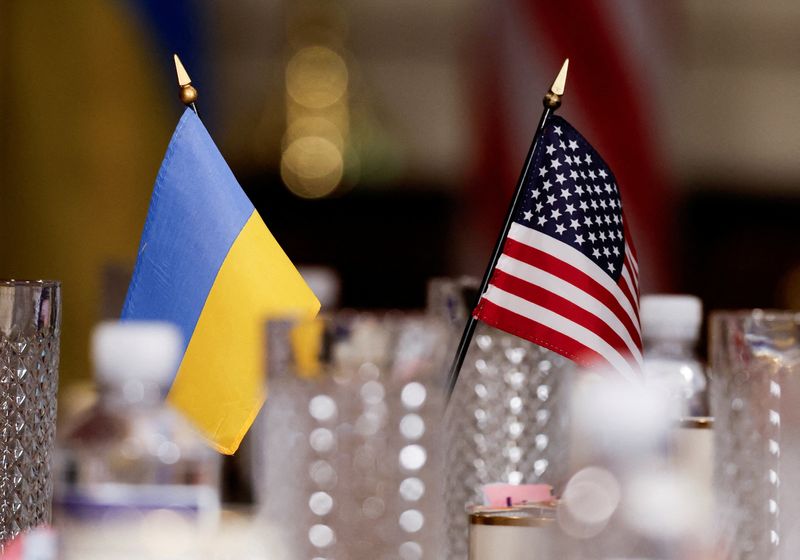
By Simon Lewis (JO:LEWJ) and Daphne Psaledakis
WASHINGTON (Reuters) - The Biden administration has moved to forgive about $4.7 billion in U.S. loans to Ukraine, State Department spokesperson Matthew Miller said on Wednesday, as outgoing officials seek to do what they can before leaving office to bolster Ukraine in its war against Russia.
A funding bill passed by the U.S. Congress in April included just over $9.4 billion of forgivable loans for economic and budgetary support to Ukraine's government, half of which the president could cancel after Nov. 15. The bill appropriated a total of $61 billion to help Ukraine fight the full-scale invasion Moscow launched in February 2022.
"We have taken the step that was outlined in the law to cancel those loans," Miller told a press briefing, adding that the step was taken in recent days.
Congress could still block the move, Miller said.
The Senate is due to vote later on Wednesday on a motion of disapproval of loan forgiveness for Ukraine put forward by Republican Senator Rand Paul, a frequent critic of U.S. support for Ukraine. The majority of senators from both parties support aid to Ukraine.
President Joe Biden has ordered officials to rush as much aid to Ukraine as possible before he leaves office on Jan. 20 amid concerns President-elect Donald Trump could limit U.S. support.
(This story has been refiled to change to 'administration,' in the headline)

